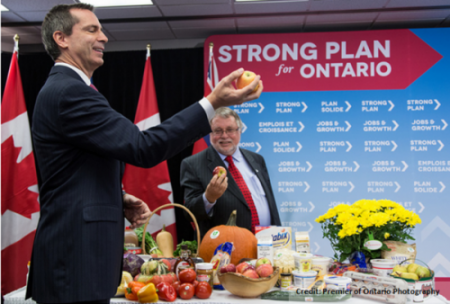5 min read
Written by Hayley Lapalme
The original version of this blog post said that Bill 130, Local Food Act, would go dormant with legislature prorogued. The Bill actually dies. This updated blog reflects a Wednesday morning conversation I had with MPP Ted McMeekin, the Minister of Agriculture Food and Rural Affairs.

On Monday, Premier Dalton McGuinty resigned and prorogued provincial legislature.
Two weeks earlier, his Liberal government introduced a Local Food Act for Ontario. Bill 130, ‘Promoting Local Food Act’ set out to foster local food economies, increase awareness of the diversity of Ontario foods, and develop new markets for it. The bill is a stride toward a more food secure and economically vibrant Ontario, giving legs and longevity to the Liberal government’s growing recognition of the value of local food.
But what is the fate of the Act in the face of prorogation? MPP Ted McMeekin, the Minister of Agriculture Food and Rural Affairs who tabled the bill, explains, “It died. It will need to be retabled in legislature.” When the new leader is chosen and legislature reconvenes, McMeekin plans on giving the bill a second life. “I will proudly stand in my place and reintroduce it.”
By proroguing legislature, the Premier has evoked frustration and criticism among opposition and supporters. But at the very least, the recess provides an occasion for citizen groups and government to flesh out their vision for the Act. Bill 130 was no fait accompli for ensuring the resilient local food system the Act aspired to create. It has been criticized for being short on commitments and only gestures toward what needs to be done, without putting much political will behind those notions of what could-should-would happen, if the province could get a few things figured out. MPP McMeekin also said he was receptive to feedback that would help to strengthen the bill
If I got the air time, I’d like to ask the MPPs who will vote on the bill to consider a few things that might give it more bite. I work with institutions to purchase local, sustainable food. From hospitals to campuses, publicly funded institutions have huge food budgets that the Act aspires to leverage to fulfill its purpose. But the way I see it, there are a few barriers the Local Food Act is going to face before it becomes a meaningful and productive piece of legislation that leads to increased local food consumption by Ontario institutions.
Groups across Ontario will craft far more sophisticated asks to the province than I allude to here, and you should chime in on them. But in the interim, here is my list of 3 questions for Ontario MPPs to chew on at recess.
HEY MPPs, THREE QUESTIONS FOR YOU!
1: What’s going on with trade barriers to local food?
The Act wants institutions to buy more Ontario grub. When you’re an institution trying to buy local food, it’s unclear whether or not you can preferentially purchase local food. Varying interpretations of NAFTA or the not-yet-signed and ever ambiguous Comprehensive Canadian-European Economic Trade Agreement (CETA) suggest that preference can(not) be given to local foods so long as the value of the contract is below a certain ceiling. Similarly, local food can(not) be given preference so long as it is headed for re-sale. Until public sector institutions spending big tax dollars on big food contracts know whether or not they are legally able to give preference to local food, the Local Food Act is just parsley on the plate. It looks nice, but no one is going to touch it.
2: What’s in it for local farmers and food entrepreneurs?
It’s tough to compete with cheap imports from hot climates with long growing seasons. Especially when their regulatory environments are as loose as Bill 130 is on its commitments. So how is the Act building the capacity of local farmers and food entrepreneurs to compete with imports? Ontario does some things really well. We could do them a whole lot better if we nurtured innovation and created a regulatory environment that valued diversity and inspired entrepreneurship, rather than stifle it. Historically Canada has been a primary resource exporting country: we send our timber, our minerals, and our water abroad for a penny and buy them back, refined and value-added, for a premium. Tracing the supply chains in our institutions, a parallel trend is obvious: Ontario imports a lot of value-added product that could be made within the province. We’re sending our processing sector south of the border and buying back pre-cooked roasts to sell to our farmers. Unless there is a vision to invest in Ontario’s ability to competitively grow, process, and market our products to institutions, we’re going to be buying our food from an ever-shrinking pool of big, foreign corporate food companies.
3: Can we get some numbers and some private sector institutions on board?
When McGuinty introduced the Local Food Act, he took the stage encouraging Ontario households to take the Local Food Challenge. He asked us to devote $10 every week from our grocery bill to local food. It’s a popular challenge that could represent a $2.4 billion dollar investment into the Ontario economy. Similarly detailed aspirations for institutions would exponentially increase the clout of the Act and the return to the province’s local food system. But the Act lacks quantifiable targets or goals to compel institutions to spend their budgets in the provincial food economy. And let’s not leave private sector institutions out of this! Until we leverage the capacity of all our institutional food buyers to mimic the behaviour we are asking of Ontario families, we are perpetuating a gap I witness all the time (myself included) that exists between personal values and work values. The Local Food Act is an opportune moment to call Ontarians and our workplace alter-egos to action on a shared project to keep a good industry growing in the province.
Keeping the Act alive when the Bill dies
This morning when I called MPP Ted McMeekin’s office, I expected an aid to answer the phone. But the MPP answered himself. Maybe I don’t call enough MPs and MPPs to know how accessible the political process is, but if I were looking for a bit of inspiration, this gave me it. With legislature in recess and MPPs liberated from the gridlocking rancor of legislature, now is prime time for them to engage with their constituents. So ready your questions and suggestions, and let’s breathe new life, and new strength into the Local Food Act.
It is the start of a great response to the current decline that the province is seeing in farmers, food processing, and health. Building resilient local food economies will reverse these trends if the new Premier and his/her cabinet give the new legislation some backbone around key questions.
Let’s make something Ontario can feast on.
